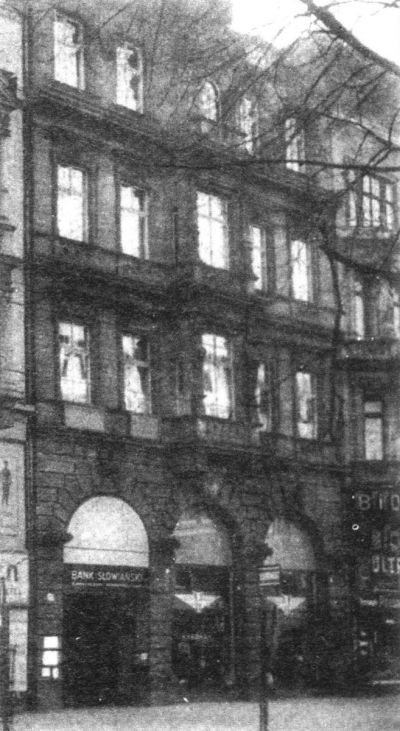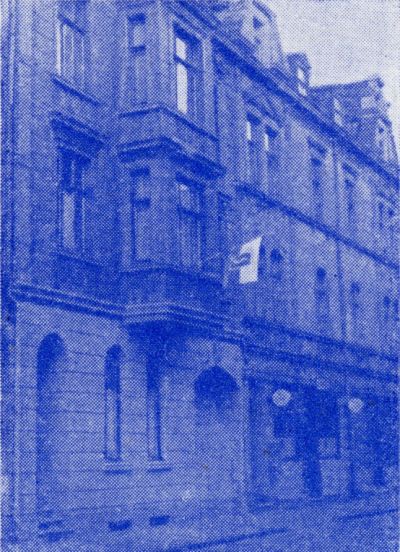The Slavic Bank

Economic difficulties at the end of the First World War had a considerable influence on the branches of Polish banks in Germany. It became necessary to improve coordination. A conference of the “Union of Poles in Germany” took place in July 1924. Its main theme was the problem of cooperatives. A decision was taken to set up a business commission at the “Union of Poles in Germany”, whose duties would include the supervision, coordination and support of Polish branch banks. Such steps were necessary because the Germans had simultaneously started an “emergency programme” aimed at helping farmers modernise their agricultural activities in the east. The farmers were given a choice between taking German aid and withdrawing from Polish banks, or being exposed to political and business chicanery. On 25th June 1927 the works council of the “Union of Poles in Germany” organised a meeting in Opole of all the cooperatives operating in Germany, where it was decided to spread the activities of the “League of Silesian Cooperatives” to the remaining existing Polish institutes in Germany. They also received material and legal help. All in all this amounted to around 15 banks and agrarian banks from all over Germany. The League now consisted of 22 credit cooperatives, four agrarian business institutes and others. Its chairman was Pastor Bolesław Domański. The changes had a positive influence on the Polish banks in Germany. They were also the precondition for working alongside banks in Poland. The “Union of Poles in Germany” put forward an application for revision, but consent was only given in 1935.
The second half of the 1920s was a time of relatively rapid growth for Polish banking cooperatives which had business and national duties alike. The banks introduced educational measures for farmers, as well as giving them legal and business advice. They also provided credit to Polish organisations and institutions. These organisations often held meetings in the banks’ rooms. The motto of the cooperatives was: “Use Cooperatives to Achieve Business Independence”. Competition and rivalry also existed amongst the Polish banks. This was above all clear in the case of the Silesian institutes and in western Germany. New legal entities were set up. In 1931 a new bank called “Unia” (Union) was founded to support the Polish educational system (schools, youth clubs, young people’s publications and other activities involving young people). The “Union of Poles in Germany” was responsible for deciding on the amount of credit involved.
On 9th January 1933 there was a meeting in Berlin of all the Polish banking cooperatives in Germany where it was decided to set up a “Central Bank of Polish Cooperatives in Germany” (the “Slavic Bank AG”, for short). One month later, on 8th February 1933, its constituent assembly took place. The start capital amounted to 150,000 RM, and in June 1937 this was raised to 500,000 RM. Its patron was Pastor Bolesław Domański and its elected director, Franciszek Lemańczyk. “The main duty of the bank” – according to a newspaper article in the “Dziennik Berliński” dated 1st June 1933 – is to centralise all the interests of the credit companies, something which had hitherto been hindered by the lack of contact between the cooperatives”. The shareholders of the “Slavic Bank” were cooperatives organised in the “League of Polish Cooperatives in Germany”. One year after the setting up of the Central Bank its work met with a very positive response. In his résumé of its activities the chairman of the Central Bank, Pastor Bolesław Domański said that: “On several occasions it has contributed to saving endangered cooperatives, and also rationalising the whole of cooperative business”. In June 1937 there was a general assembly of the Slavic Bank. The final general assembly took place on 27th April 1938, a few months before the outbreak of the Second World War.
The deterioration in German-Polish relationships had a considerable influence on Polish financial institutes. The German regime strongly decreased their ability to purchase real estate and sell land and building plots. This problem was a subject of much discussion at the final meeting of the “League of Polish Cooperatives in Germany” which took place in Breslau (Wrocław) on the 15th December 1938.
The Polish banks possessed a great deal of real estate which they put at people’s disposal for meetings and celebrations. They also took an active part in organising Polish life in Germany, including giving credit to finance the construction of school buildings. For example the “Pomoc” (Aid) bank financed the first Polish grammar school in Bytom; and the school equipment was financed from credit given by the Workers’ Bank in Bytom in 1932. The Slavic Bank was the owner of the student boarding school in Breslau (the administrative and editorial teams of the journal “Młody i Mały Polak w Niemczech” (Young and Small Poles in Germany) worked in its rooms. The Slavic Bank also owned the grammar school in Marienwerder (Kwidzyń), the building land in Racibórz on which the girls’ grammar school was to be built.
On 27th February 1940, following a “Decree on the Organisation of Polish People’s Groups in the German Reich”, all Polish organisations and activities, including those of banking cooperatives, were banned and their assets confiscated. After the Second World War the “Union of Poles in Germany” attempted to get the assets restored and applied for compensation. It was only partially successful. The problem of restitution of the confiscated property is still a subject of controversial discussion today.
Krzysztof Ruchniewicz, June 2014



